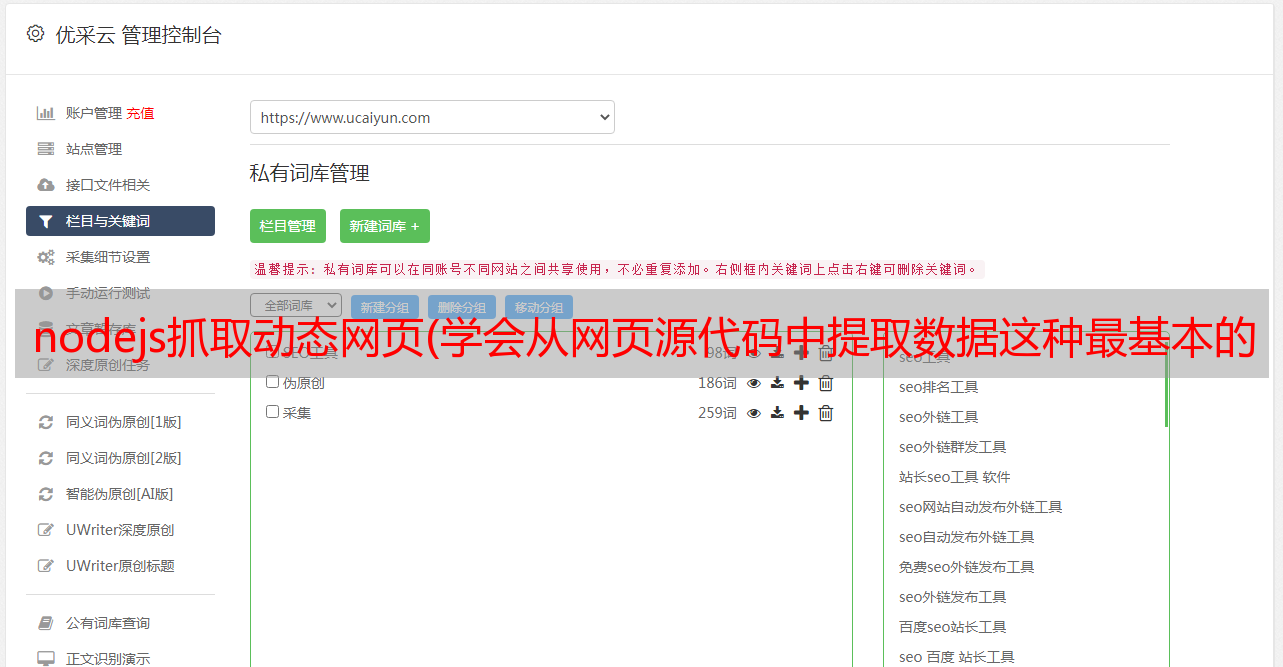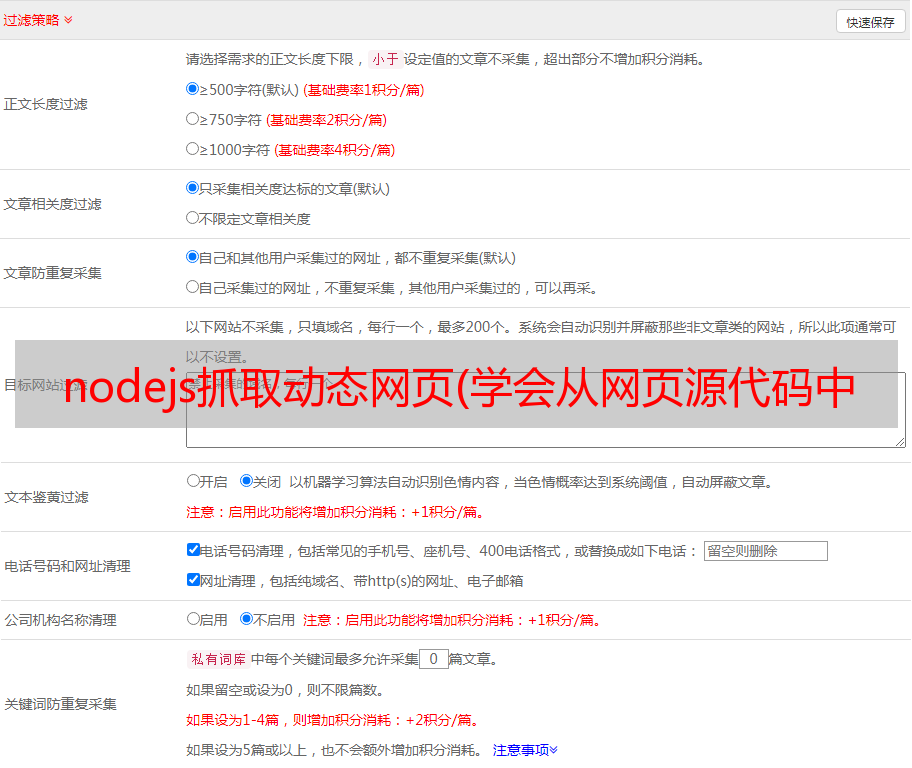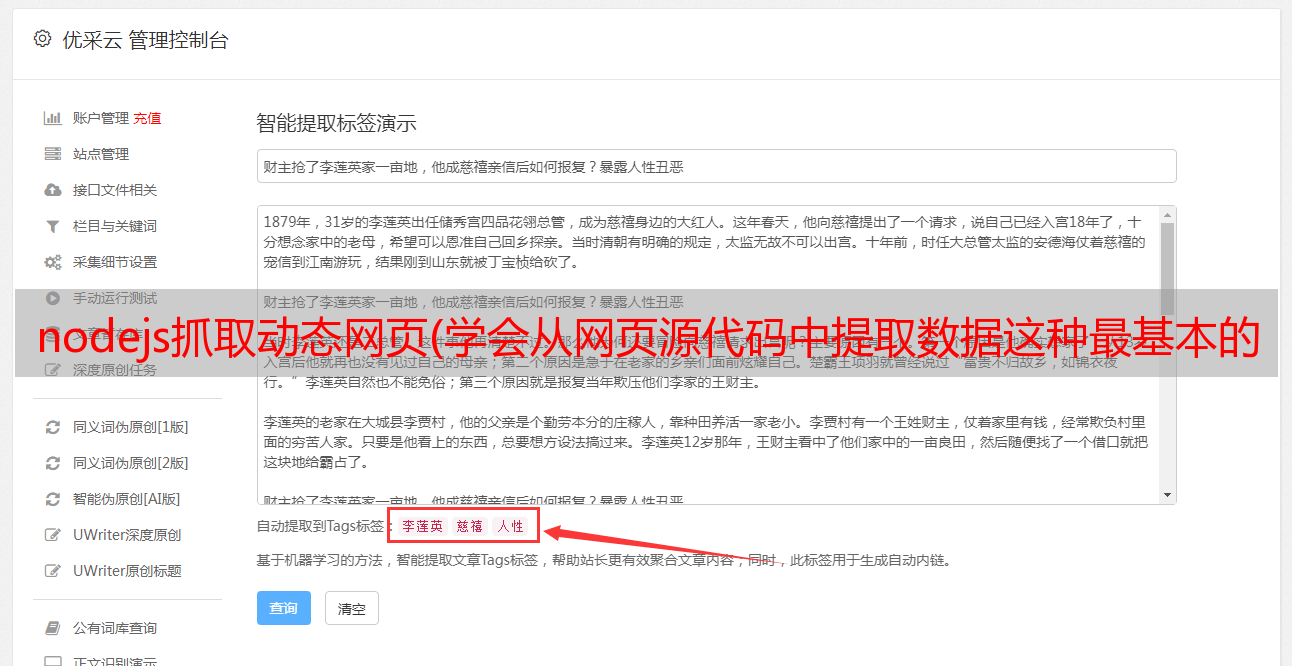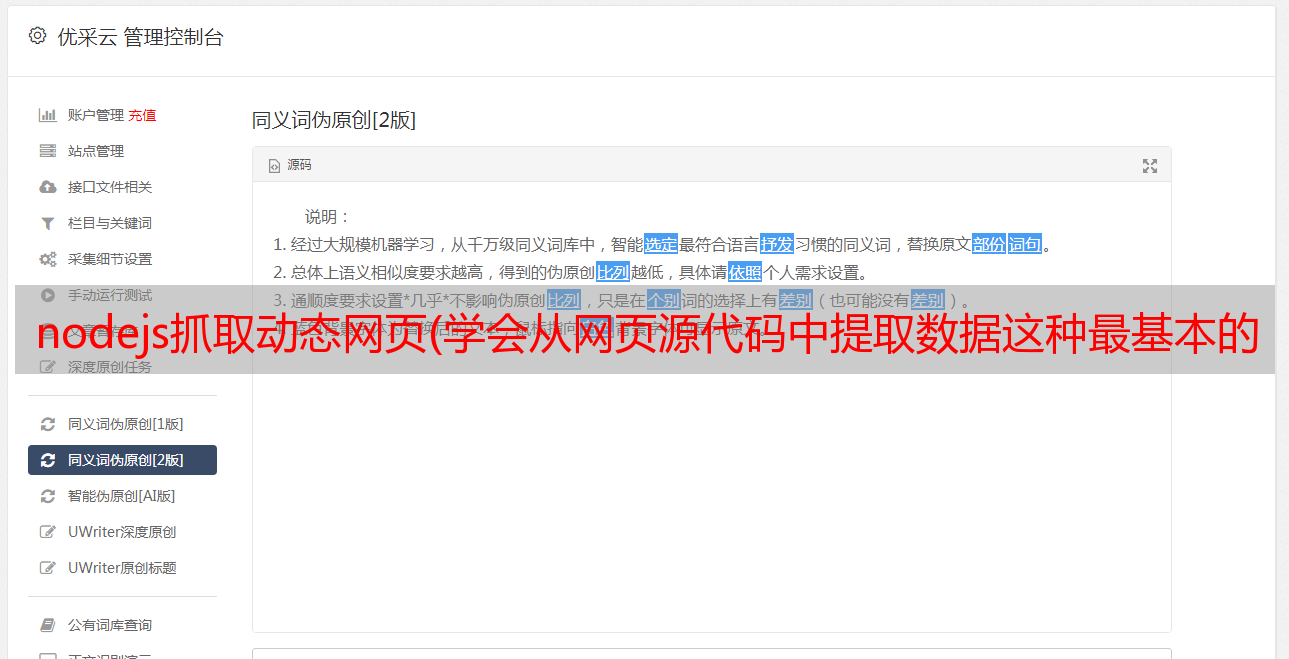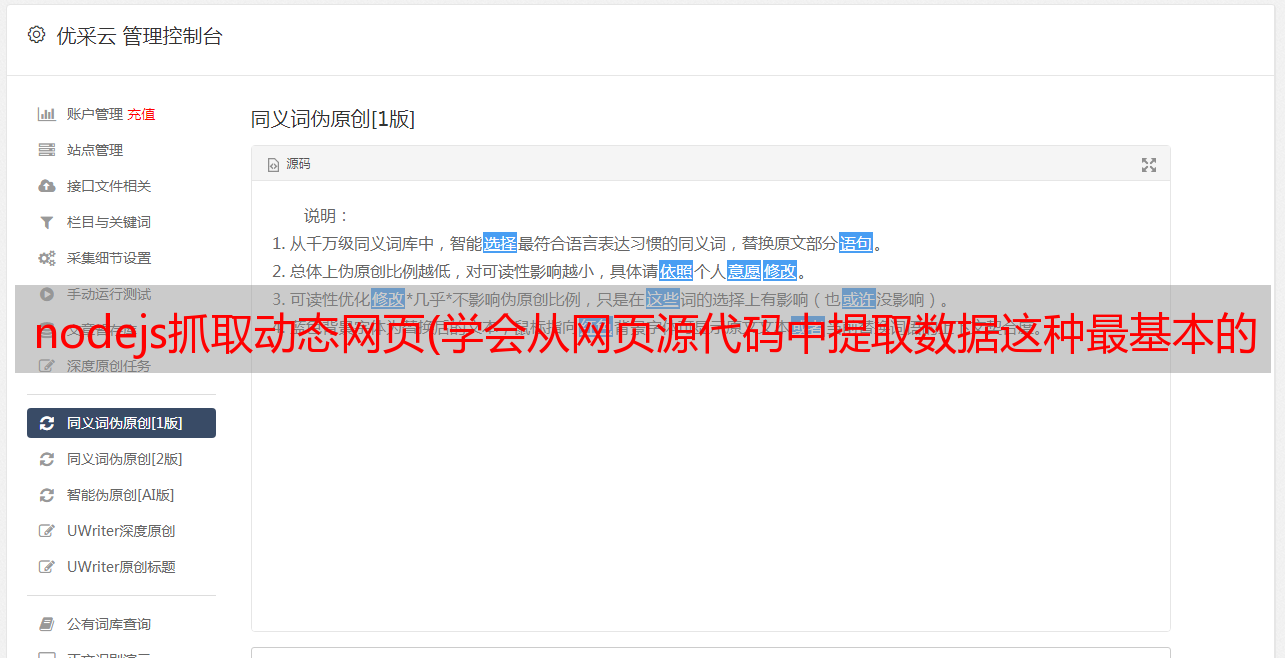nodejs抓取动态网页(学会从网页源代码中提取数据这种最基本的爬虫使用json文件保存的数据)
优采云 发布时间: 2021-11-04 03:18nodejs抓取动态网页(学会从网页源代码中提取数据这种最基本的爬虫使用json文件保存的数据)
其实爬虫是一项对计算机综合能力要求比较高的技术活动。
首先是对网络协议,尤其是http协议有基本的了解,能够分析网站的数据请求响应。学会使用一些工具,简单的使用chrome devtools的网络面板。我通常和邮递员或查尔斯合作分析。对于更复杂的情况,您可能需要使用专业的数据包捕获工具,例如wireshark。您对 网站 了解得越深,就越容易想出简单的方法来抓取您想要的信息。
除了了解一些计算机网络知识外,还需要具备一定的字符串处理能力,特别是正则表达式。其实正则表达式在一般的使用场景中不需要很多进阶知识,比较常用。稍微复杂一点的是分组、非贪婪匹配等。俗话说,如果你学好正则表达式,你就不怕处理字符串。
还有一点就是要掌握一些反爬虫的技巧。你在写爬虫的时候可能会遇到各种各样的问题,但是别怕,12306再复杂,也有人能爬,还有什么难我们。常见的爬虫会遇到服务器检查cookies、检查host和referer header、表单隐藏字段、验证码、访问频率限制、代理要求、spa网站等问题。其实爬虫遇到的大部分问题,最终都可以通过操纵浏览器来爬取。
本文使用nodejs编写爬虫系列的第二部分。对抗一个小爬虫,抓取流行的 github 项目。想要达到的目标:
学习从网页的源代码中提取数据。这个基本的爬虫使用一个 json 文件来保存捕获的数据。熟悉我在上一篇文章中介绍的一些模块。学习如何在node中处理用户输入分析需求
我们的需求是从github上抓取热门的项目数据,即star数最高的项目。但是github上好像没有任何页面可以看到排名靠前的项目。往往网站提供的搜索功能是我们爬虫作者分析的重点。
之前在灌v2ex的时候,看到一篇讨论996的帖子,刚教了一种用github star查看顶级仓库的方法。其实很简单,只需要在github搜索中加上star数的过滤条件,例如:stars:>60000,就可以搜索到github上所有star数大于60000的仓库。分析下面的截图,注意图片中的评论:
分析可以得到以下信息:
这个搜索结果页面通过get请求返回html文档,因为我的网络选择了Doc过滤url中的请求参数。有3个参数,p(page)表示页数,q(query)表示搜索内容,type表示搜索内容类型
然后我想知道github会不会检查cookies和其他请求头如referer、host等,根据是否有这些请求头来决定是否返回页面。
一个比较简单的测试方法是直接使用命令行工具curl进行测试,在gitbash中输入如下命令,即curl“请求的url”
curl "https://github.com/search?p=2&q=stars%3A%3E60000&type=Repositories"
不出所料,页面的源代码正常返回,这样我们的爬虫脚本就不需要添加请求头和cookie了。
通过chrome的搜索功能,可以看到网页源代码中有我们需要的项目信息
分析到此结束。这其实是一个很简单的小爬虫。我们只需要配置查询参数,通过http请求获取网页的源码,然后使用解析库进行解析,就可以在源码中得到我们需要的项目相关信息。,然后将数据处理成数组,最后序列化成json字符串存入json文件中。
动手实现这个小爬虫获取源代码
通过node获取源码,需要先配置url参数,然后通过发送http请求的模块superagent访问配置的url。
'use strict';
const requests = require('superagent');
const cheerio = require('cheerio');
const constants = require('../config/constants');
const logger = require('../config/log4jsConfig').log4js.getLogger('githubHotProjects');
const requestUtil = require('./utils/request');
const models = require('./models');
/**
* 获取 star 数不低于 starCount k 的项目第 page 页的源代码
* @param {number} starCount star 数量下限
* @param {number} page 页数
*/
const crawlSourceCode = async (starCount, page = 1) => {
// 下限为 starCount k star 数
starCount = starCount * 1024;
// 替换 url 中的参数
const url = constants.searchUrl.replace('${starCount}', starCount).replace('${page}', page);
// response.text 即为返回的源代码
const { text: sourceCode } = await requestUtil.logRequest(requests.get(encodeURI(url)));
return sourceCode;
}
上面代码中的constants模块用于保存工程中的一些常量配置。到时候需要改常量,直接改这个配置文件,配置信息比较集中,方便查看。
module.exports = {
searchUrl: 'https://github.com/search?q=stars:>${starCount}&p=${page}&type=Repositories',
};
解析源码获取项目信息
这里我把项目信息抽象成一个Repository类。在项目models目录下的Repository.js中。
const fs = require('fs-extra');
const path = require('path');
module.exports = class Repository {
static async saveToLocal(repositories, indent = 2) {
await fs.writeJSON(path.resolve(__dirname, '../../out/repositories.json'), repositories, { spaces: indent})
}
constructor({
name,
author,
language,
digest,
starCount,
lastUpdate,
} = {}) {
this.name = name;
this.author = author;
this.language = language;
this.digest = digest;
this.starCount = starCount;
this.lastUpdate = lastUpdate;
}
display() {
console.log(` 项目: ${this.name} 作者: ${this.author} 语言: ${this.language} star: ${this.starCount}
摘要: ${this.digest}
最后更新: ${this.lastUpdate}
`);
}
}
解析得到的源码,需要用到cheerio这个解析库,和jquery很像。
/**
* 获取 star 数不低于 starCount k 的项目页表
* @param {number} starCount star 数量下限
* @param {number} page 页数
*/
const crawlProjectsByPage = async (starCount, page = 1) => {
const sourceCode = await crawlSourceCode(starCount, page);
const $ = cheerio.load(sourceCode);
// 下面 cheerio 如果 jquery 比较熟应该没有障碍, 不熟的话 github 官方仓库可以查看 api, api 并不是很多
// 查看 elements 面板, 发现每个仓库的信息在一个 li 标签内, 下面的代码时建议打开开发者工具的 elements 面板, 参照着阅读
const repositoryLiSelector = '.repo-list-item';
const repositoryLis = $(repositoryLiSelector);
const repositories = [];
repositoryLis.each((index, li) => {
const $li = $(li);
// 获取带有仓库作者和仓库名的 a 链接
const nameLink = $li.find('h3 a');
// 提取出仓库名和作者名
const [author, name] = nameLink.text().split('/');
// 获取项目摘要
const digestP = $($li.find('p')[0]);
const digest = digestP.text().trim();
// 获取语言
// 先获取类名为 .repo-language-color 的那个 span, 在获取包含语言文字的父 div
// 这里要注意有些仓库是没有语言的, 是获取不到那个 span 的, language 为空字符串
const languageDiv = $li.find('.repo-language-color').parent();
// 这里注意使用 String.trim() 去除两侧的空白符
const language = languageDiv.text().trim();
// 获取 star 数量
const starCountLinkSelector = '.muted-link';
const links = $li.find(starCountLinkSelector);
// 选择器为 .muted-link 还有可能是那个 issues 链接
const starCountLink = $(links.length === 2 ? links[1] : links[0]);
const starCount = starCountLink.text().trim();
// 获取最后更新时间
const lastUpdateElementSelector = 'relative-time';
const lastUpdate = $li.find(lastUpdateElementSelector).text().trim();
const repository = new models.Repository({
name,
author,
language,
digest,
starCount,
lastUpdate,
});
repositories.push(repository);
});
return repositories;
}
有时搜索结果有很多页,所以我在这里写了一个新函数来获取指定页数的仓库。
const crawlProjectsByPagesCount = async (starCount, pagesCount) => {
if (pagesCount === undefined) {
pagesCount = await getPagesCount(starCount);
logger.warn(`未指定抓取的页面数量, 将抓取所有仓库, 总共${pagesCount}页`);
}
const allRepositories = [];
const tasks = Array.from({ length: pagesCount }, (ele, index) => {
// 因为页数是从 1 开始的, 所以这里要 i + 1
return crawlProjectsByPage(starCount, index + 1);
});
// 使用 Promise.all 来并发操作
const resultRepositoriesArray = await Promise.all(tasks);
resultRepositoriesArray.forEach(repositories => allRepositories.push(...repositories));
return allRepositories;
}
让爬虫项目更人性化
随便写个脚本,在代码中配置好参数,然后爬取,有点太粗暴了。这里我使用了readline-sync,一个可以同步获取用户输入的库,并添加了一点用户交互。在后续的爬虫教程中,我可能会考虑使用electron来做一个简单的界面。下面是程序的启动代码。
const readlineSync = require('readline-sync');
const { crawlProjectsByPage, crawlProjectsByPagesCount } = require('./crawlHotProjects');
const models = require('./models');
const logger = require('../config/log4jsConfig').log4js.getLogger('githubHotProjects');
const main = async () => {
let isContinue = true;
do {
const starCount = readlineSync.questionInt(`输入你想要抓取的 github 上项目的 star 数量下限, 单位(k): `, { encoding: 'utf-8'});
const crawlModes = [
'抓取某一页',
'抓取一定数量页数',
'抓取所有页'
];
const index = readlineSync.keyInSelect(crawlModes, '请选择一种抓取模式');
let repositories = [];
switch (index) {
case 0: {
const page = readlineSync.questionInt('请输入你要抓取的具体页数: ');
repositories = await crawlProjectsByPage(starCount, page);
break;
}
case 1: {
const pagesCount = readlineSync.questionInt('请输入你要抓取的页面数量: ');
repositories = await crawlProjectsByPagesCount(starCount, pagesCount);
break;
}
case 3: {
repositories = await crawlProjectsByPagesCount(starCount);
break;
}
}
repositories.forEach(repository => repository.display());
const isSave = readlineSync.keyInYN('请问是否要保存到本地(json 格式) ?');
isSave && models.Repository.saveToLocal(repositories);
isContinue = readlineSync.keyInYN('继续还是退出 ?');
} while (isContinue);
logger.info('程序正常退出...')
}
main();
来看看最后的效果
这里我想提一个readline-sync的bug。在windows的vscode中使用git bash时,不管你的文件格式是不是utf-8,都会出现中文乱码。搜索了一些问题,在powershell中把编码改成utf-8就可以正常显示了,也就是把页码剪成65001。
项目完整源码和后续教程源码将存放在我的github仓库:Spiders。如果我的教程对你有帮助,希望你不要吝啬你的星星。后续教程可能是更复杂的案例,通过分析ajax请求直接访问界面。
